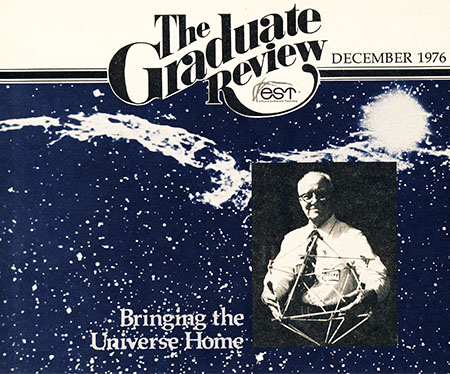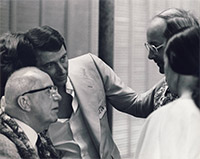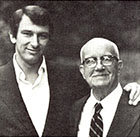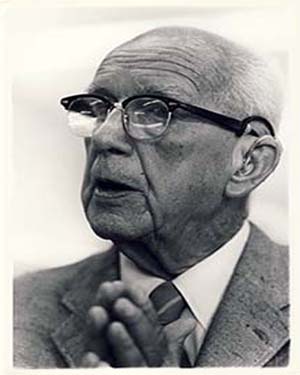
GRADUATE REVIEW: I'd like to start off asking you something very basic. I understand you said recently that the planet would be pretty much handled within 10 years. Could you explain ....
BUCKY FULLER: No, I didn't say anything about the planet. I spoke about human beings on the planet. I said the human implant on this planet Earth is in what I call "final examination." We've been here for — the Leakeys' fossil finds make it pretty clear — for at least 2 1/2 to 3 million years. All humanity has always been born naked, absolutely helpless at birth, with beautiful equipment but no experience of what to do with it, absolutely ignorant. So we start out naked, helpless, ignorant.
We are given a drive of hunger, and of thirst, curiosity, need to breathe, and then in due course the procreative urge. With such drives to be satisfied, and being absolutely ignorant, we had to proceed by trial and error.
We had a brain to start off with. The brains of all creatures are always only coordinating the special-information input of the senses: What you're hearing, seeing, smelling . . . . They're coordinating that, and they are able to recall it. What you recall is, "This one smelled this way in contradistinction to the way that one smelled." Brain deals always and only in special cases.
Gradually human beings began to discover principles, such as, for instance, the lever. In contradistinction to what they could lift with their muscles, they found they could do 20 and 30 times as much work just using their heads. Only minds have the capability to discover principles.
[Note: Bucky's word' "brain" indicates the machinery that Werner Erhard calls the "mind," and Bucky's "mind" is analogous to Werner's "self." Also, Bucky's "principle" is roughly analogous to what Werner Erhard means when he says "abstraction" or "generating principle."]
What minds can discover is the relationships existing between special cases that are not in the special case by
themselves.
For instance, man for millions of years was stimulated by the sight of the stars in the sky, by an awareness that there seemed to be a fixed set of patterns of stars or constellations, that there were the bright sun and the moon, and in addition there were four or five lights that seemed to be a little brighter than the others and moved around. Gradually, by enough recording, we produced in rapid sequence the discoveries of a Copernicus, a Kepler, a Galileo, a Newton. It's amazing how much man was able to record in relation to what his given pattern of life and observation was.
Once we got a mathematical calculating capability — the positioning of numbers through the positioning of the ciphers, of columns moving over (which came from the abacus, through the Arabs, which was introduced in the Mediterranean world in about 1200 and took 300 years to get permeated enough, through enough scholars) —the conceptions and assumptions of scientists in general could be translated from a mystical belief to demonstrable and usable reality.
Suddenly a Copernicus with calculating capability discovered that not only was the sun not going around us but that we were going around the sun with the other planets. Then we have Kepler making his very extraordinary discoveries and measurements, and Galileo making his with falling bodies, and finally Isaac Newton evolving an awareness that if you halve the distance between two objects you increase the energy of attraction fourfold; if you double the distance between them you reduce it to one-quarter; so you have a geometrical rate of change in relationship to an arithmetical distance. That's a great rate of change.
We have, then, a generalized principle which is discovered by mind. But if you asked Mr. Newton, he could show you nothing in the moon by itself or this planet by itself that says it's going to attract another body. For hundreds of thousands of years people had been aware that something is going on between, and he discovered what is going on between. But it's not of. Only the human mind has this capability to discover the relationships existing between that are not of.
In this way you begin to discover synergetics — that is, the behaviors of whole systems unpredicted by the behavior of any of the parts considered only separately.
This to me is man on our planet and his trial: He discovers he has mind, he has access to these generalized principles and begins to look at the family of generalized principles — which society is not taught to do. We are taught to be specialists instead of looking across the board. We are taught to look at the parts rather than the whole.
If you intend to carry on with the proclivity you have as a child, to understand all, you say, "I'd like to look at the whole." I had the good luck to have an education in physics and biology, and in one way and another became interested in looking at the whole. I worked with all the known generalized principles so far, and found that one of the most exciting things about them is that none of them had ever been found to contradict any of the others.
In order to qualify as generalized principles, they have to be eternal —that is, they must be forever, there must be no exception. We find brains dealing always and only in special cases, and all special cases are terminal — that is, finite. Brain helps man explain how the universe begins and how it ends, but mind discovers general eternal principles, so we discover we're dealing in eternity with the mind.
This word, "eternal," is so unfamiliar to the brain that it hasn't gotten to be very popularly understood. The fact is, here are these eternal principles, all concurrently operative, and what is most extraordinary is that none of them has been found to contradict another, and many of them inter-augment one another. The parts are arranged in relation to one another. We have the human mind that is gradually pulling the curtain aside, discovering the little great designs of the universe itself, the eternal design.
Pure abstraction is expressible only mathematically, and you can't make a generalized anything. We learn then how to discover the principles that make a special case of the objective use of the principles.
Humans are here, then, with that kind of capability in developing instruments, understanding the principles of optics, developing telescopes and chemical emulsions. For instance, we've photographed our heavens around us to 111/2 billion light years. Well, 99.9 percent of it is invisible to the naked eye; nevertheless we get detailed photographs. We now know that our little planet is an incredibly small planet with a very small star, which is one of a hundred billion stars in our galaxy. We have now photographed billions of galaxies. We have been able to take the light emanating from them, and we've learned that each chemical element has its own frequencies. Human beings on our planet have absolutely no physical stature as far as Universe goes, yet we have inventoried the chemical elements present within 1111/2 billion light years.
Minds have that kind of capability, our muscles have nothing, yet in human affairs muscle is still in control, so we're really in a bind. It's really a final examination when we discover our mind is everything, but coming out of the long muscle period — in which the big man reached the fruits and the big man stands out in front of you to guard you when there's a war — the power structure, by conditioned reflex, is still in control of our human affairs.
We find those who are lucky to find a place where nature is bountiful and growing continually being invaded by those who are not so lucky. So it is a working assumption of the great majority of humanity that there is a lethal inadequacy of life support on our planet. Therefore we have politics. Human beings have had politics for so long that they assume that it's part of life, part of the universe. Each ideology is saying, "We have the fairest, most logical, most ingenious way to cope with lethal inadequacy."
But because there are diametrically opposed theories of how to do it — the socialists and the capitalists and so forth — and the other side will not yield, we can only test which is fittest to survive by trial of arms, so for the past 20 years Russia and the United States and their allies have been sum-totally appropriating two hundred billion a year for destruction.
It's not just a waste of dollars, this focusing the highest capabilities of man on how to destroy. Rather than trying to look and see whether they can make man work, they focus only on physical properties. They have nothing for the metaphysical at all, and the whole game is metaphysical.
We've now developed enough awareness, enough principles, to really be able to carry on and to really function in a much bigger way in a universal sense. I see humanity as local monitors in Universe. We're local monitors with access to the great design of Universe itself — some of it, we don't know how much we don't know about it. (Chuckling.) The more we know the more we realize how little we know. Yet we have enough of it to be able to be a useful local monitor.
Information - agglomerating and problem-solving: What's common to all lives is problem-solving. So we have a young world — that is, young people in the world — with more and more proclivity to find out what the truth is, and to solve problems in terms of the truth rather than someone's opinion. These are the most favorable conditions that are manifest. GRADUATE REVIEW: Are you saying that one of the conditions that's allowing this to happen is a technological sophistication, or at least a condition en the planet that allows people to deal with some of the lethal inadequacies they see?
BUCKY FULLER: We're finding our way by trial and error and satisfying all the drives that have to be satisfied if you aren't to die.
GRADUATE REVIEW: But you're not saying that machinery is going to ....
BUCKY FULLER: I will simply state to you that all machinery is a lever. It's what we call a mechanical advantage. I don't know how much you can build up the mechanical advantage, how much energy you can put on the ends of the lever.
We have a very strange and difficult condition confronting humanity, really, in relationship to what you were just saying. There are 40 million scientists and engineers on our planet, and that seems like a lot. Yet it's only one percent of humanity, the 4 billion people. Ninety-nine percent of humanity cannot understand what science and technology are talking about, because they cannot read the mathematics of it. And the science is operating in a non-conceptual mathematics, operating in a very inadequate and incredibly awkward mathematics. We have physics saying that we must do everything experimentally, that we must be able to repeat the experiment and demonstrate the proof, yet physics itself accepted mathematical tools that had no experimental evidence whatsoever. There is no experimental evidence of a two-dimensional plane. You can't have a two dimensional plane. We can't have anything that is not four-dimensional, and science froze in on three dimensionality, thinking the Earth was flat and perpendicular and parallel.
The universe doesn't operate in perpendiculars and parallels. Things are either convergent gravitationally, or divergent radiationally. Physics is completely out of gear with mathematics. So in order to cope, having only three dimensional mathematics and needing to deal with four dimensionality, it had to go and invent another universe, and it has all kinds of abstractions with all kinds of probabilities. So 99 percent of humanity doesn't understand this absolutely circuitous, awkward kind of mathematics.
This means that 99 percent don't realize that all that science is discovering is that the universe is nothing but technology. How does your eye work? How is that tied up to that brain? How are you and I communicating, making some sounds and getting some meanings from them? Incredible technology. I'm 81, and my hand is still working. I've processed over 1,000 tons of
food, and unlike any machine — we have trouble with machines, we have down-time when we can't use them —this [holds out a hand] is continually researching without any down-time. Boy, what a design!
The universe is nothing but technology. You have the 99 percent who don't know this because they don't understand what science is finding —that the universe has all these beautiful laws that govern it and that you and I were given the ability to apprehend and employ those principles — and we find the society assuming (not understanding it) that technology is something new and that it is just weapons or exploitation of humanity, just big business or war.
So you have humanity — we used to have the pharaohs running it, then the nobles, then the rich middle class, and suddenly everybody is in on it. And everybody is so ignorant about this one great possible way we're going to cope that this is a great dilemma. This brought me into synergetics.
I've now discovered the coordinate system being employed by nature mathematically. It is conceptual and it is four-dimensional, and a child can do nuclear physics. Everything comes out as it does in chemistry, all rational numbers, and yet scientists — having learned to get on in an awkward way, working in the dark, flying entirely on instruments — don't dare to abandon their own system because they've got an enormous amount of time invested in it. The computer came along and made it possible to do those very awkward mathematical things in a fairly easy way, so they're just playing a pure mystery game now. When they see what I have, they sometimes resist, because they're not used to conceptuality, they don't expect any models.
But I find that whereas the physicist finds things out, if you want to have any use for the physics, you're going to have to have electrical engineers. Electrical engineers find synergetics and just eat it up. They say, "That's it!"
To me, the most critical thing in my days is to make it as possible as I can for that 99 percent who don't understand the mathematics to acquire the mathematics by virtue of which they can mutually understand exactly what is going on.
GRADUATE REVIEW: If 99 percent don't know how to use the tool, it seems like a pretty hopeless situation. Yet you don't seem hopeless at all.
BUCKY FULLER: I find that we can short-circuit them completely by exposing a young world to the mathematics that does work, that is conceptual, that any child can learn. It's a little demeaning to the scientists to find that the child in kindergarten can do nuclear physics, so they don't go for it in a hurry. But you can find a large number of the young world falling in love with it, and there are more and more physicists and scientists beginning to know I'm right. I'm getting incredible letters from them.
For instance, just after the session I had with Werner and Jaime at Town Hall in New York, I received a note from a scientist at MIT who has worked with Jay Forrester [a major contributor to the Club of Rome report, Limits of Growth], and he said he'd had no idea what a dilemma science is really in, that he'd never had such a clear experience of what science is really about.
(Note: The scientist, Peter Senge (an est graduate and doctoral candidate at MIT), gave The Graduate Review permission to quote from his letter. Here is part of it: "Sometime long ago I'd bought the idea that science was some mysterious process in which only brilliant people made important contributions. As my education progressed, I completely forgot the decision I'd made about science and consequently became completely stuck. I always tried to be smarter than I was. I constantly evaluated myself for not understanding quickly enough. I think Saturday was the first time I realized the extent of the lie I'd told myself, the position I'd stuck myself in. As I listened to you, I suddenly realized that true science is putting the data of your experience in order — that great scientists discover principles by virtue of their ability to base what they know on their personal experience, not on the way they — or anyone else — believe a system operates, to demand direct 'experimental evidence.' When I realized that, I also realized how simple (not easy) real science is. The process is truly available to anyone willing to be committed to telling the truth about their experience. Including me. I want you to know how really excited I am about the opportunity that opens for me in my own work. "]
GRADUATE REVIEW: Dr. Fuller, what happens when the people in kindergarten do learn nuclear physics, and when the means to handle the environmental problems
that you talk about are clearly there? Will everyone be happy then? Is there more to it? What happens next?
BUCKY FULLER: We're in for an acceleration in change which is going to be equivalent to the chicken in an egg, with all its nutriment, being given the opportunity to be an absolute form. It's inside an egg, it is formed, it uses up its nutriment. It pecks the egg open, and suddenly there is a chicken on its feet, and a new relationship to the universe.
I think we're coming out of a group womb of permitted ignorance. We are beginning to understand that our enormous cushion of resources —the original excessively-abundant living supply of life support in the biosphere — was provided only to permit us to make all the mistakes by trial and error and come to the discovery that our mind is everything and our muscle is nothing. We're coming out of that group womb.
It's going to be such a different relationship for man that I find it quite difficult for people to understand.
Think of a chart 800 years long, from 1250 to 2000 A.D., showing the curve of acceleration of science vs. time. For simplicity, start with a closed family in science: There are 92 regenerative chemical elements, and membership is determined by the numbers: One electron, one proton, and so forth.
When history opened, man had already isolated and was using nine chemical elements: carbon, iron, gold, silver, copper, tin, mercury, lead, zinc. On the chart you go up one step for each chemical element that was found, and across one step for each
unit of time. The first known isolation of the next chemical element by man is around 1250, and is arsenic. So the chart begins at 1250, ten steps high. It goes 200 years to the discovery of antimony. Another 200 years, then phosphorus. Then another 75 years until the next discovery, and from there on the curve goes up very rapidly as 79 additional elements are isolated in 200 years.
In 1932, the depth of the Depression, the year Roosevelt was elected, we made the 92nd isolation and the family of regenerative chemical elements was complete. This curve is a fascinating curve against time, and you're finally going in enormous accelerations. The slowdowns turn out to always be wartime. It's always been thought that science prospers in wartime; you find that in wartime they're using what science found out yesterday, but the actual pure science slows right down.
Now, against that curve of the great rise of science against time, let's see if you could take what is learned sum-totally and make it possible for man to exist in some environment where, naked and helpless, he hadn't been able to exist before.
I'm going to make this kind of test: From within the part of the environment that he controls, can he control energy operating outside it to take him in one complete circuit of our Earth? Here's Magellan in 1520, in a wooden sailing ship in an environment like Cape Horn where he never could exist before, controlling the winds outside to take him around. Then 350 years later he goes around in a steel steamship. And 75 years later he goes around in an aluminum airplane. And 35 years later he goes around in an exotic-metals rocket. In the wooden ship he took two years to go around, in the steel steamship two months, in the airplane two weeks the first time, and in the rocket just a little over an hour.
Now we have something very extraordinary here in this 800 years. At the time of the wooden sailing ship, nobody could possibly contemplate the steel steamship. At the time of the steamship, there was absolutely no contemplation of going around in an aluminum airplane. At the time of the aluminum airplane, no concept of possibly going around in an exotic-metals rocket. So these are complete changes of state of art.
I have then the acceleration of science against time itself, I have the contraction between the arts of the 350, 75, 35 years; and I have a third acceleration, which is the rate at which he went around. On that chart, it's implicit that by 1985 I'm going to have to be doing something as surprising as sending you around by radio.
GRADUATE REVIEW: Here's what I have to ask you after that example. Is Magellan, this person who's going around, the same person? What's the difference between the Magellan who went around in 1520 and the Magellan who went around in the exotic-metals rocket-ship?
BUCKY FULLER: In the human being? I'd say absolutely no change at all. I'm astonished. I get evidence of human mindedness in the Bhagavad Gita or Lao Tse, of enormous capability with relatively little instrumentation. The wisdom had to make up in the early
days for the lack of instrumentation. These principles are actually operative within ourselves, so there is some way to extrapolate the principles within ourselves to explain what's going on out there. All these faculties are always in here.
I don't see the human being changing, but we've had very little appreciation through most of the period of how much there really is in a child. People have said to children, "Now, never mind what you think, we're going to try to teach you something." It was a working assumption when I was young. Young people's minds are supposed to be something like unjelled Jell-O, and that's not so. As the young world is demonstrating today, they have this beautiful thinking capability.
They do lack experience. They've been taken away from the farm, taken away from the intimacy with nature, or the ship, and put in the city. So they need an enormous amount of encouragement to find their own way. They are going to do their own thinking. They are going out in the country again to get the feelings of being out there, of going sailing out there in different ways.
GRADUATE REVIEW: You've said that all children are born geniuses and are de-geniused.
BUCKY FULLER: Every child is born a genius
and gets de-geniused very rapidly
through the loving fear of the parents
that the child is going to get into trouble and get the kind of pains they had.
Inasmuch as all humans got to
where we are entirely by trial and error, we had to make incredible numbers of mistakes to get here. It's only when you're making a mistake, only the time when you say, "I really am making a mistake" — not somebody else telling you that you're making a mistake — "I really am, I've been kidding myself," when you get that out of the way, you suddenly see what is.
All the gains of humanity come under those conditions. You hear that in Werner's kind of training, too.
We've now made the total mistake of society saying, "Nobody should make mistakes. We'll fire you, you can't graduate. . . . " If I were running the school, anybody who got all the answers, I'd fire them. I'd say, "You didn't learn a thing, you just learned by rote, you're just memorizing." I'd give the highest marks to people who tell me how many mistakes they made and what they learned from them.
GRADUATE REVIEW: You mentioned Werner Erhard's kind of training. As you know, est is about enlightenment, or transformation. What do those terms mean to you?
BUCKY FULLER: I'll tell you what I see in Werner Erhard's work. He has been really thinking about what happened to him, and thinking it over again, and not getting so fancy that it's the other person's fault, just unkidding himself. If you unkid yourself, then you're enlightened. You're getting out of the way of what isn't so, so you can see what is so. Enlightenment is inadvertent. Only when you're being good
with yourself by saying, "I am wrong," then you look up and there it is. You didn't know you were going to get the reward.
GRADUATE REVIEW: What does it take to have a person realize that? Do most people go through their lives never realizing what's so? Would you say the average person does?
BUCKY FULLER: Evolution is at work and I cannot assess my fellow man. Everybody has gestation rates, each has incredible checks and balances. So when we make extremes one, way, we get extremes the other way.
GRADUATE REVIEW: Was there a time when you became enlightened? That may be the wrong terminology for you. Was there something that happened to you?
BUCKY FULLER: Of course. Something's happening to us all the time, but just to give some of the very prominent factors: Our first child was born during World War I, and had first flu, then spinal meningitis, then infantile paralysis, and we were able to keep her surviving until she was almost four. She had a beautiful mind and her personality was incredible. And then she died. Five years later, in 1927, we had a new child, absolutely healthy. We were suddenly being entrusted with this....
And at that moment I was absolutely bust, I'd been trying to play the game and found I was interested in what would make a good building, not in making money. So I was an outcast. But whether I cared to be or not, I was the custodian of a vital resource, my diverse inventory of experience. I made a bargain with myself that I'd attempt to discover the principles operative in the universe and turn over what I found to my fellow man.
Whatever I was going to be able to do had to be by virtue of my dealing with the only asset I had, and that was my experience. So I had to do something about looking my experience over, and though nobody had taught me how to think, I had to learn to think.
GRADUATE REVIEW: You've said that life is a game. Do you see it that way?
BUCKY FULLER: Words are going to get us in a lot of trouble. I do speak about the game of life, but I've tried to look at it, really, from a comprehensive, intellectual-integrative universe, really testing itself in its own integrity by making some difficult situations in the universe to see where the integrity really is.
All we know physically is that the universe is eternally regenerative, everywhere transforming, at all times everywhere and everywhere transforming.
GRADUATE REVIEW: I know you have a feeling about an evolution going on in the world, and I'm wondering: You've called this "Earthians' critical moment." Is there something that we need to do to succeed? Is there any doubt that we will?
BUCKY FULLER: It's absolutely touch and go, whether we'll come out of this. We're in final exam, I try to make that very clear. If we come out of the womb with muscle in control, it's a stillbirth. Because we're here for our minds. Muscle is still in control, so it's very much touch and go: Is mind really going to come through?
It is coming through with the young world. I'm getting letters from the kids who were born after man got to the moon.
As each successive child is born, it is confronted with less misinformation than yesterday and with more reliable information than yesterday. Each child is born into a much larger womb of more intellectually competent consciousness.
I was born and brought up in a little local town and was seven years old before I saw an automobile. I was eight years old when the Wright Brothers flew. As a child I thought spontaneously only in terms of walking, bicycling, horse-handling. Two men in my home town had been to Europe, and they gave talks about it
each year.
My daughter was born with cloth-covered biplanes in her sky and the talkie radio in her hearing. My granddaughter was born in a house with several jet transports going over every minute. To children born in 1970, trips to the moon will be as everyday an event as trips to the big city were to me as a boy. Television came when I was what is called "retiring age." The first Berkeley dissident students were born the year commercial television started. They have been around the world on the hour ever since. They think world. The child of today is born entirely in terms of thinking, not only about the planet, about total resources, but beyond.
My lifetime has been one of emerging from the womb of human-being remoteness-from-one-another to an integration of worldaround humanity. But all the customs, all the languages, all laws, all accounting systems, viewpoints, cliches and axioms are of the old, divided, ignorant days. The corollary of "divide and conquer" is "to be divided is to be conquered." To be specialized is to be divided. The specialization that humanity perseveres in was invented by yesterday's armed conqueror illiterates. The separation of humans into more countries made them easy to manage. Nations may unite, as at present, without success. Strife is proliferating. Not until
specialization and nations are dispensed with will humanity have a chance of survival. It is to be all or none.
GRADUATE REVIEW: And what does that mean for each individual?
BUCKY FULLER: It depends on whether enough of humanity really feels the challenge to their integrity — to not throw a thing on the floor, to wait until you do come to a wastebasket, to put it in your pocket until then, don't stuff it under the bed.
The integrity of an individual is what counts. Are you really going to go in your mind, will you be thoughtful, will you realize what kind of planet it really means if you do this?
Are you willing to say, "I'm really willing to share this"?

December 1976 - The Graduate Review |







